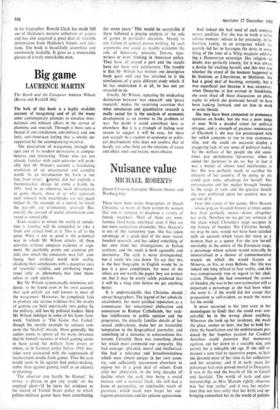Nuisance value
MICHAEL ROBERTS
There have been many biographies of Queen Christina; so many of them written by women that one is tempted to diagnose a variety of female weakness. Most of them are unin- formed, third-hand, uncritical, even if they are not mere scandalous chronicles. Miss Masson's is not of this turnpenny type. She has taken advantage of a good deal of the most recent Swedish research, and has added something of her own from her investigations in Italian archives; and the result is both agreeable and instructive. The style is never distinguished, but it rarely lets you down. To say that this is the best biography in English would be to pay it a poor compliment, for most of the others are not worth the paper they are written on; but it may be pretty safely predicted that it will be a long time before we get anything better.
It is understandable that Christina should attract biographers. The legend of her scholarly attainments, her more justified reputation as a connoisseur, her sensational abdication and conversion to Roman Catholicisin, her reck- less indifference to public opinion and the proprieties, the drearily familiar details of her sexual ambivalence, make her an irresistible temptation to the biographical journalist, and something of a nuisance to conscientious' his- torians. Certainly there was something about her which must command our sympathy. She had courage—physical, moral and- intellectual. She had a tolerance and broadmindedness which were almost unique in her own COUR., try, and sufficiently uncommon elsewhere to expose her to a good deal of odium. Even after her abdication, in the long decades of s-. decline when she sank into being a social menace and a sartorial freak, she still had a force of personality, an indefinable touch of greatness, which made men forget her out- rageous pretensions and her epicene appearance. And indeed she had need of such compen. satory qualities. For she was in truth a rather odious-woman: odious in her precocity, in her limitless vanity, in an arrogance which fre- quently led her to harangue the deity in some. thing of the tone of a Whig magnate address- ing a Hanoverian sovereign. Her religion, no doubt, was perfectly sincere, for it was always a device for exalting herself; and this was true whether the creed of the moment happened to be Stoicism, or Libertinism, or Molinism. She had a good deal of learning, certainly; but it was superficial just because it was extensive: when Descartes at last arrived in Stockholm, she soon shied off those discussions on philo- sophy to which she professed herself to have been looking forward, and set him to work to write libretti.
She may have been competent to pronounce opinions on books, but she was a poor judge of men. With a decided talent for political intrigue, and a strength of purpose reminiscent of Elizabeth I. she was loo preoccupied with her selfish concerns to rise to true statesman- ship, and she could on occasion display a staggering lack of any sense of political reality. To the welfare of her people she did some- times pay perfunctory lip-service, when it suited her purposes to do so; but in fact it was a matter of almost total indifference to her. She was perfectly ready to sacrifice the interests of her country, if by doing so she could gain some advantage for herself. Her extravagance and her neglect brought Sweden to the verge of ruin, and the greatest benefit she ever conferred upon her country was to get out of it.
Over this aspect of her career, Miss Masson —whose grip on Swedish history at times seems less than perfectly secure—skates altogether too airily. Nowhere do we get any estimate of the place which Christina's reign occupies in the history of Sweden. Yet Christina herself, we may be sure, would not have been satisfied with an account which treats her more as a woman than as a queen. For she saw herself inevitably in the centre of the European stage, a personage whose actions would naturally be immortalised in a shower of commemorative medals on which she would feature as Minerva, or Iris, or even Bellona. Her life was indeed one long refusal to face reality, and this was conspicuously true in regard to her abdi- cation. Though she had renounced the crown of Sweden, she was in her own estimation still as important a personage as she had been when she wore it: if the world did not accept that proposition as self-evident, so much the worse for the world.
It never occurred to her (not even in her monologues to God) that she could ever con- ceivably be in the wrong about anything. Wherever she took up her residence, she made the place, sooner or later, too hot to hold her. Only the humiliation and the embitterment pro- duced by her hopeless passion for Cardinal Azzolino could puncture that monstrous egotism, cut her down to a sociable size, and permit her a tolerable old age. If she still re- mained a sore trial to successive popes, at least she devoted most of her time to her collections and her academy; and if in early years her patronage had once proved mortal to Descartes, it was in the end the breath of life to Corelli and Scarlatti. The world of taste and con- noisseurship, as Miss Masson rightly observes, was 'her true realm,' and it was her misfor- tune (but not hers only) that her birth and up- bringing committed her to the world of politics.


































 Previous page
Previous page